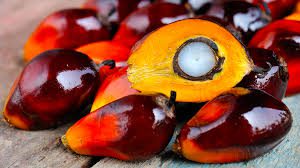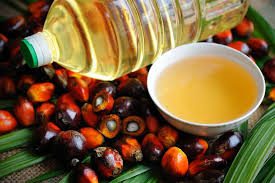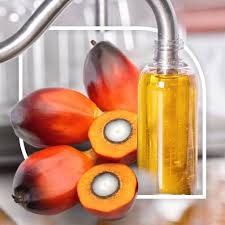Palm kernel oil is a type of vegetable oil that is derived from the seeds or kernels of the oil palm tree (Elaeis guineensis). It is obtained by extracting the oil-rich kernels from the inner part of the palm fruit.
Palm kernel oil has a light yellow to dark brown color, depending on the level of refining it undergoes. It has a high saturated fat content, which gives it a solid or semi-solid state at room temperature. The oil has a distinct nutty flavor and a mild aroma.
Due to its unique properties, palm kernel oil is widely used in various industries, including food, cosmetics, and personal care products.
Palm kernel oil is used in the food industry for cooking, frying, and baking. It is often found in processed foods such as margarine, shortening, and confectionery products. It is also used as a substitute for cocoa butter in chocolate production.
Palm kernel oil is used in the formulation of cosmetics and personal care products due to its emollient properties. It is commonly found in soaps, lotions, creams, and hair care products. The oil’s high saturated fat content contributes to its moisturizing and conditioning effects on the skin and hair.
Palm kernel oil is considered a potential feedstock for biodiesel production. Its high energy content and favorable properties make it suitable for blending with diesel fuel to reduce greenhouse gas emissions.
Palm kernel oil is used in various industrial applications, such as lubricants, detergents, and surfactants. It can also be utilized in the production of candles, waxes, and other chemical compounds.
It’s worth noting that the production of palm kernel oil has faced criticism due to concerns over deforestation, habitat destruction, and the displacement of indigenous communities. Sustainable practices, such as certified palm oil production and responsible sourcing, are being encouraged to mitigate these environmental and social impacts.
Economic Importance, Uses, and By-Products of Oil Palm’s Palm Kernel Oil

Oil palm’s palm kernel oil has several economic importance and uses. Here are some of the key ones:
1. Cooking Oil: Palm kernel oil is commonly used as a cooking oil due to its high heat stability and neutral flavor. It is widely used in households and the food industry for frying, baking, and sautéing. Its solid form at room temperature makes it suitable for producing solid fats like margarine and shortening.
2. Food Ingredient: Palm kernel oil is used as an ingredient in various food products, including confectionery, bakery goods, ice cream, and spreads. It helps improve the texture, taste, and shelf life of these products. Additionally, it is often used as a substitute for cocoa butter in chocolate production.
3. Personal Care Products: Palm kernel oil is a common ingredient in personal care products such as soaps, shampoos, lotions, and cosmetics. Its high lauric acid content provides moisturizing and emollient properties, making it beneficial for skin and hair care products.
4. Biofuel: Palm kernel oil can be processed into biodiesel, a renewable and cleaner-burning alternative to fossil fuels. The oil’s high energy content and low sulfur content make it suitable for use in diesel engines. The biofuel industry contributes to reducing greenhouse gas emissions and dependence on fossil fuels.
5. Animal Feed: Palm kernel oil cake, a byproduct of palm kernel oil extraction, is used as a nutritious feed ingredient for livestock, particularly in the poultry industry. It is rich in protein and essential nutrients, providing a cost-effective alternative to other feed ingredients.
6. Industrial Applications: Palm kernel oil finds application in various industries. It is used in the production of detergents, lubricants, candles, and other industrial products. The oil’s unique properties, such as high oxidative stability and low viscosity, make it suitable for these applications.
Examples of economic uses of palm kernel oil include:
In the food industry, palm kernel oil is used to make products like cooking oils, margarine, chocolate, and bakery goods. For instance, it is commonly used in the production of cookies, biscuits, and pastries to enhance texture and increase shelf life.
In the personal care industry, palm kernel oil is utilized in the manufacturing of soaps, shampoos, lotions, and cosmetics. It acts as a moisturizer and contributes to the creamy texture of personal care products.
Palm kernel oil’s conversion into biodiesel serves as an alternative and sustainable fuel source. It can be used in diesel vehicles, reducing dependence on fossil fuels and promoting environmental sustainability.
Palm kernel oil cake is a valuable ingredient in animal feed, providing essential nutrients to livestock. This helps enhance animal health, growth, and productivity, benefiting the agricultural sector.
Industrial applications of palm kernel oil include the production of detergents, lubricants, and candles. The oil’s properties make it suitable for these manufacturing processes, leading to a range of industrial products.
7. Pharmaceutical Industry: Palm kernel oil is used in the pharmaceutical industry for the production of medicines, ointments, and topical creams. It serves as a base ingredient and aids in the absorption of certain drugs. Additionally, the oil’s antimicrobial properties make it beneficial in certain pharmaceutical applications.
8. Oleochemical Industry: Palm kernel oil is a vital raw material in the oleochemical industry, which produces a wide range of chemicals derived from natural fats and oils. It is used to manufacture products such as fatty acids, fatty alcohols, surfactants, emulsifiers, and glycerol. These chemicals find application in various industries, including cosmetics, detergents, lubricants, and plastics.
9. Export and Trade: Palm kernel oil is a significant commodity in global trade. Many countries, particularly those with a favorable climate for oil palm cultivation, export palm kernel oil to international markets. This trade contributes to foreign exchange earnings, employment opportunities, and economic growth for producing countries.
10. Rural Livelihoods: Oil palm cultivation, including the production of palm kernel oil, provides income and livelihood opportunities for smallholder farmers and rural communities. It is an important source of employment, especially in regions where oil palm is a major cash crop. The cultivation, harvesting, and processing of palm kernels create jobs throughout the value chain, supporting local economies.
11. Infrastructure Development: The palm kernel oil industry often drives infrastructure development in producing regions. Plantations require transportation networks, processing facilities, storage infrastructure, and related services. The establishment and expansion of these facilities contribute to the overall development of rural areas.
12. Economic Diversification: Palm kernel oil production diversifies the economies of producing countries, reducing their reliance on a single agricultural commodity. This diversification helps enhance economic stability, reduce vulnerability to price fluctuations, and promote sustainable development.
Read Also : Economic Importance, Uses, and By-Products of Oil Palm Kernel
13. Employment Opportunities: The palm kernel oil industry generates a significant number of employment opportunities, both directly and indirectly. Along with the cultivation and harvesting of oil palm, there are jobs in processing mills, transportation, distribution, and related services. This helps alleviate unemployment and poverty in many palm oil-producing regions.
14. Income Generation: Palm kernel oil production provides a source of income for farmers, plantation workers, and various stakeholders involved in the supply chain. The sale of palm kernel oil and its byproducts contributes to household incomes and local economies, supporting livelihoods and improving living standards.
15. Foreign Investment and Trade: The palm kernel oil industry attracts foreign investment, as it is a lucrative sector with high demand. International companies invest in plantations, processing facilities, and infrastructure, fostering economic growth and promoting global trade relationships.
16. Research and Technological Advancements: The palm kernel oil industry drives research and technological advancements in agriculture, processing methods, and product development. This contributes to innovation, efficiency, and productivity improvements, benefiting the entire sector.
17. Economic Stability and Food Security: The production of palm kernel oil contributes to economic stability and food security in producing countries. It provides a reliable source of income for farmers and ensures a steady supply of edible oils for domestic consumption and international trade.
18. Co-Product Utilization: Along with palm kernel oil, the palm kernel itself is used to produce palm kernel meal, which serves as a valuable feed ingredient for livestock. This utilization of co-products reduces waste and adds economic value to the oil palm industry.
19. Infrastructure Investment: The palm kernel oil industry often leads to infrastructure development, including roads, ports, and storage facilities, to facilitate transportation and export of palm kernel oil. These investments in infrastructure support overall economic growth and facilitate trade.
20. Economic Multiplier Effect: The palm kernel oil industry has a multiplier effect on the economy. The income generated from palm kernel oil production is often spent on other goods and services, leading to increased economic activity in related sectors such as retail, transportation, hospitality, and education.
It’s important to note that while the economic benefits of palm kernel oil are significant, sustainable practices and responsible production methods are crucial to mitigate environmental and social impacts. Adherence to sustainable certifications, investment in research and development, and the implementation of good agricultural practices can contribute to a more sustainable palm kernel oil industry.
The Products and By-products That Can Be Derived From Oil Palm’s Palm Kernel Oil

Palm kernel oil (PKO) is derived from the kernel of oil palm fruits. It has a variety of applications in different industries, and several products and by-products can be derived from it. Here are some of the main products and by-products of palm kernel oil, along with their examples and processes:
1. Palm Kernel Oil (PKO): PKO is extracted by pressing or solvent extraction of the palm kernel.
Example: PKO is used as a cooking oil, ingredient in food products, and as a raw material in the production of personal care products, soaps, and detergents.
2. Palm Kernel Cake (PKC): After the oil is extracted from the palm kernel, the remaining kernel solids are processed into a cake.
Example: PKC is widely used as animal feed for livestock, especially in the production of poultry, swine, and cattle feed.
3. Palm Kernel Meal (PKM): PKM is produced by grinding and further processing the palm kernel cake.
Example: PKM is also utilized as animal feed, similar to PKC, and is rich in protein and fiber content.
4. Palm Kernel Expeller (PKE): PKE is obtained by solvent extraction or mechanical pressing of palm kernel.
Example: PKE is used as an ingredient in animal feed formulations due to its high energy and fat content.
5. Palm Kernel Shell (PKS):: PKS is the hard outer shell of the palm kernel.
Example: PKS is commonly used as a biomass fuel in industries such as power generation, boilers, and heating systems.
6. Palm Kernel Fiber (PKF): PKF is the fibrous material surrounding the palm kernel.
Example: PKF is used as a raw material for the production of mattresses, cushions, and natural fiber-based products like ropes and mats.
7. Palm Kernel Sludge (PKSg): Process: PKSg is the residue obtained after palm kernel oil extraction.
Example: PKSg can be converted into organic fertilizers or used in composting, contributing to agricultural sustainability.
8. Palm Kernel Olein (PKOlein) and Palm Kernel Stearin (PKStearin): Process: These are different fractions obtained by fractionation of palm kernel oil.
Example: PKOlein is used in the formulation of food products, while PKStearin finds application in the production of margarine, shortenings, and confectionery items.
9. Palm Kernel Wax: Palm kernel wax is obtained by refining the palm kernel oil and separating the wax fraction.
Example: Palm kernel wax is used in the production of candles, polishes, cosmetics, and coatings due to its high melting point and excellent hardness.
Read Also : Economic Importance, Uses, and By-Products of Oil Palm’s Palm Oil
10. Glycerol: ycerol, also known as glycerin, is a by-product of the palm kernel oil refining process.
Example: Glycerol has numerous applications, including its use in pharmaceuticals, cosmetics, food products, and as a component in the production of polyols and resins.
12. Fatty Acids: Fatty acids are obtained by the hydrolysis of palm kernel oil, followed by the separation and purification of individual fatty acid compounds.
Example: Fatty acids derived from palm kernel oil are utilized in the manufacturing of soaps, detergents, cosmetics, and personal care products.
13. Biofuel: Palm kernel oil can be converted into biodiesel through a process called transesterification.
Example: Palm kernel oil biodiesel serves as an alternative and renewable energy source for transportation, reducing greenhouse gas emissions and dependence on fossil fuels.
14. Cosmetics and Personal Care Products: Palm kernel oil and its derivatives are used as ingredients in the formulation of various cosmetics and personal care items.
Example: Palm kernel oil is found in products such as lotions, creams, lip balms, soaps, shampoos, and hair conditioners.
15. Emulsifiers and Surfactants: Certain derivatives of palm kernel oil, such as fatty acid esters and glyceryl stearate, are utilized as emulsifiers and surfactants.
Example: These ingredients are commonly found in skincare products, cosmetics, and food items to stabilize emulsions, improve texture, and enhance product performance.
16. Lubricants and Industrial Applications: Palm kernel oil can be modified and processed to create lubricants and industrial oils.
Example: These products find application in various industries, including automotive, machinery, and manufacturing, where lubricants are needed for smooth operations and reduced friction.
These products and by-products demonstrate the versatility of palm kernel oil and its potential to contribute to various industries, ranging from food and agriculture to cosmetics, energy, and manufacturing.

Read Also : How to Make an Avocado Tree Bear Fruit
